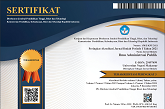Enhancing Community Participation in Public Services through Participatory Innovation
(1) Business Administration Program, International Women University, Indonesia
(2) Business Administration Program, International Women University, Indonesia
(3) Business Administration Program, International Women University, Indonesia
(*) Corresponding Author
DOI: https://doi.org/10.26858/jiap.v13i1.45357
Abstract
The Indonesian government has recognized the importance of community participation in the provision of public services. However, community participation in the public sector is often limited due to various factors, such as lack of access to information, limited resources, and low levels of trust in government institutions. To address these challenges, participatory innovation has been identified as a potential solution to enhance community participation in public services. This study aims to explore the role of participatory innovation in enhancing community participation in public services in Indonesia. Specifically, this study seeks to identify the factors that facilitate or hinder the implementation of participatory innovation and to provide insights for public sector organizations to implement participatory innovation effectively. This study adopts a qualitative research approach. Semi-structured interviews were conducted with public sector officials and members of the community who have experience with participatory innovation in the public sector. The data collected from the interviews were analyzed using thematic analysis. Results: The findings of this study suggest that participatory innovation can enhance community participation in public services in Indonesia. The implementation of participatory innovation has resulted in several positive outcomes, such as increased trust in government institutions, improved access to information, and increased community involvement in decision-making processes. However, the implementation of participatory innovation also faces several challenges, such as a lack of resources, limited capacity of public sector officials, and bureaucratic culture.
Full Text:
PDFReferences
Akib, H., Rifdan, & Guntur, M. (2015). Quality improvement strategies of academic services and student affairs at the Graduate Program State University of Makassar, Indonesia. International Journal of Applied Business and Economic Research, 13(4).
Amayah, A. T. (2013). Determinants of knowledge sharing in a public sector organization. Journal of Knowledge Management.
Ashaye, O. R., & Irani, Z. (2019). The role of stakeholders in the effective use of e-government resources in public services. International Journal of Information Management, 49, 253–270. https://doi.org/https://doi.org/10.1016/j.ijinfomgt.2019.05.016
Bovaird, T. (2007). Beyond engagement and participation: User and community coproduction of public services. Public Administration Review, 67(5), 846–860.
Brown, A., Fishenden, J., Thompson, M., & Venters, W. (2017). Appraising the impact and role of platform models and Government as a Platform (GaaP) in UK Government public service reform: Towards a Platform Assessment Framework (PAF). Government Information Quarterly, 34(2), 167–182. https://doi.org/https://doi.org/10.1016/j.giq.2017.03.003
Drezgić, S., Žiković, S., & Tomljanović, M. (2019). Economics of Digital Transformation (Issue February).
Dy, A., & Agwunobi, A. J. (2019). Intersectionality and mixed methods for social context in entrepreneurship. International Journal of Entrepreneurial Behaviour and Research, 25(8), 1727–1747. https://doi.org/10.1108/IJEBR-12-2017-0498
Edwards, G. (2017). Introduction to public administration. Library Press. https://doi.org/10.1111/j.1747-1346.2009.00216-1.x
Hattab, S., Wirawan, H., Salam, R., Daswati, D., & Niswaty, R. (2022). The effect of toxic leadership on turnover intention and counterproductive work behaviour in Indonesia public organisations. International Journal of Public Sector Management, 35(3), 317–333. https://doi.org/10.1108/IJPSM-06-2021-0142
Mazzucato, M., & Kattel, R. (2020). COVID-19 and public-sector capacity. Oxford Review of Economic Policy, 36(Supplement_1), graa031. https://doi.org/10.1093/oxrep/graa031
Overman, S. (2016). Great expectations of public service delegation: A systematic review. Public Management Review, 18(8), 1238–1262. https://doi.org/10.1080/14719037.2015.1103891
Rengifurwarin, Z. A., Akib, H., Jasruddin, & Salam, R. (2018). Snapshot of public service quality in the center for integrated business service (CIBS), cooperative micro small and medium enterprises (CMSME), Maluku province, Indonesia. Journal of Entrepreneurship Education, 21(3).
Tangi, L., Benedetti, M., Gastaldi, L., Noci, G., & Russo, C. (2020). Mandatory provisioning of digital public services as a feasible service delivery strategy: Evidence from Italian local governments. Government Information Quarterly, 101543. https://doi.org/https://doi.org/10.1016/j.giq.2020.101543
Todisco, L., Tomo, A., Canonico, P., Mangia, G., & Sarnacchiaro, P. (2020). Exploring social media usage in the public sector: Public employees’ perceptions of ICT’s usefulness in delivering value added. Socio-Economic Planning Sciences, 100858. https://doi.org/https://doi.org/10.1016/j.seps.2020.100858
Windrum, P., & Koch, P. M. (2008). Innovation in public sector services: entrepreneurship, creativity and management. Edward Elgar Publishing.
Article Metrics
Abstract view : 117 times | PDF view : 34 timesRefbacks
- There are currently no refbacks.
Copyright (c) 2022 Dadan Saputra, Rizka Aulia Assaf, Asep Zulkifli Achmad

This work is licensed under a Creative Commons Attribution 4.0 International License.
Diterbitkan oleh:
Program Studi Ilmu Administrasi Publik
Program Pascasarjana Universitas Negeri Makassar
JIAP Index By:

This work is licensed under a Creative Commons Attribution 4.0 International License.









